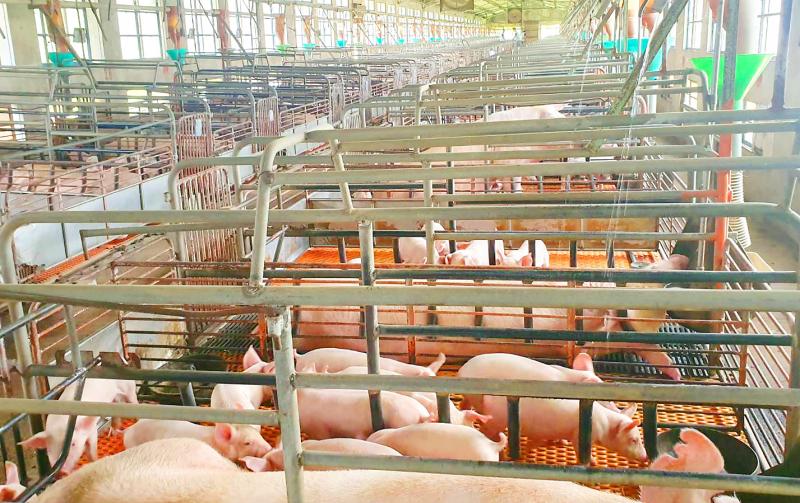The level of ractopamine residue in meat products is regulated by international food safety standards, so people should not worry about imports of US pork containing the additive, former vice president Chen Chien-jen (陳建仁) said yesterday.
Chen made the remarks in response to media queries on the sidelines of the International Medical Forum at Taipei Medical University.
“The government has set food safety standards according to international norms... So, people do not have to worry about food safety,” he said.

Photo: Yang Chin-cheng, Taipei Times
The issue of US pork and beef imports has been a problem for about two decades, and now that it has been resolved, people should accept the policy to facilitate Taiwan-US trade relations, he added.
President Tsai Ing-wen (蔡英文) on Friday announced that Taiwan would ease restrictions on US beef and pork imports, and set standards for ractopamine residue in pork products in an effort to negotiate a trade deal with the US.
The announcement sparked opposition from the Chinese Nationalist Party (KMT) and pig farmers, who raised concerns over its possible negative health effects.
Some local government leaders, including those in Taichung and Yunlin County, said that they would use self-government ordinances to continue implementing a zero-tolerance ban on pork containing ractopamine residue.
Self-government ordinances in Changhua and Hsinchu counties, as well as a few other cities and counties, ban pork containing ractopamine residue.
Chen said the central and local governments need to communicate more on the issue.
Separately yesterday, former president Chen Shui-bian (陳水扁) wrote on Facebook that during his presidency he “repeatedly faced political pressure from the US to allow US beef and pork” imports, adding that his successors, former president Ma Ying-jeou (馬英九) and Tsai, probably did as well.
Chen Shui-bian said he only allowed imports of US beef that was deboned and came from cattle under 30 months old.
As for beef with bones and internal organs, as well as beef and pork from animals over 30 months old, he said “no” to the US, citing scientific evidence and public health concerns, he said.
Chen Shui-bian quoted former American Institute in Taiwan director Stephen Young as saying that the issue of US beef is not one of science or health, but rather a political one.
He said that the US kept pressuring him even toward the end of his second term, when he was acting as the head of a “caretaker government” and could no longer make major decisions.
Chen Shui-bian said that he asked Young to ask Ma, who was then president-elect, whether himself and Ma could share the responsibility and make a joint announcement.
However, Ma was unwilling, Chen Shui-bian said, adding that after Ma assumed office, he was still “forced” to make the decision to allow imports.
The easing of restrictions on US beef and pork imports might, as Tsai said on Friday, be an “important starting point” for comprehensive Taiwan-US economic cooperation and promote Taiwan-US relations, Chen Shui-bian said.
“What Tsai Ing-wen did not say was that she could no longer resist the political pressure from the US,” he added.

Several Chinese Nationalist Party (KMT) officials including Chairman Eric Chu (朱立倫) are to be summoned for questioning and then transferred to prosecutors for holding an illegal assembly in Taipei last night, the Taipei Police said today. Chu and two others hosted an illegal assembly and are to be requested to explain their actions, the Taipei City Police Department's Zhongzheng (中正) First Precinct said, referring to a protest held after Huang Lu Chin-ju (黃呂錦茹), KMT Taipei's chapter director, and several other KMT staffers were questioned for alleged signature forgery in recall petitions against Democratic Progressive Party (DPP) legislators. Taipei prosecutors had filed

Taiwan would welcome the return of Honduras as a diplomatic ally if its next president decides to make such a move, Minister of Foreign Affairs Lin Chia-lung (林佳龍) said yesterday. “Of course, we would welcome Honduras if they want to restore diplomatic ties with Taiwan after their elections,” Lin said at a meeting of the legislature’s Foreign Affairs and National Defense Committee, when asked to comment on statements made by two of the three Honduran presidential candidates during the presidential campaign in the Central American country. Taiwan is paying close attention to the region as a whole in the wake of a

President William Lai (賴清德) has appointed former vice president Chen Chien-jen (陳建仁) to attend the late Pope Francis’ funeral at the Vatican City on Saturday on his behalf, the Ministry of Foreign Affairs said today. The Holy See announced Francis’ funeral would take place on Saturday at 10am in St Peter’s Square. The ministry expressed condolences over Francis’ passing and said that Chen would represent Taiwan at the funeral and offer condolences in person. Taiwan and the Vatican have a long-standing and close diplomatic relationship, the ministry said. Both sides agreed to have Chen represent Taiwan at the funeral, given his Catholic identity and

Lawmakers from the Democratic Progressive Party (DPP) yesterday established a friendship group with their counterparts in Ukraine to promote parliamentary exchanges between the two countries. A ceremony in Taipei for the Taiwan-Ukraine Parliamentary Friendship Association, initiated by DPP Legislator Chen Kuan-ting (陳冠廷), was attended by lawmakers and officials, including Deputy Minister of Foreign Affairs Francois Wu (吳志中) and European Economic and Trade Office in Taiwan Director Lutz Gullner. The increasingly dire situation in Ukraine is a global concern, and Taiwan cannot turn its back when the latter is in need of help, as the two countries share many common values and interests,